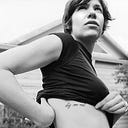The Dark with the Light: The Duality of Mitski
If you would let me give you pinky promise kisses
Then I wouldn’t have to scream your name
Atop of every roof in the city of my heart
“Well I’m not a moon, I’m not even a star/ But awake at night I’ll be singing to the birds,” declares Mitski on the lead single of her 2016 album Puberty 2. She separates herself from anything grand while humbly asserting herself in the role of the musician, a line that encompasses her self-depreciative yet honest persona that has established her as one of the most beloved artists of the 2010s.
Born in Japan in 1990 to a Japanese mother and American father, Mitski Miyawaki moved frequently as a child, living in thirteen countries before settling in the United States. Growing up as a sort of nomad with multi-racial parents left Mitski in a perpetual liminal space, a quality that is reflected in her music as well as feelings of inadequacy and an affinity for the underdog.
Mitski’s music often feels like she is exploding or reaching an emotional precipice, screaming and muttering her desires and contradictions with equal attractiveness; even at Mitski’s lowest points she manages to deliver and distort language with an undeniable seductiveness. These qualities are what makes her work impossible to look away from. She paints depression and devotion with the same brush, colors that bleed together which ultimately yield a tragically beautiful portrait.
One of Mitski’s strengths is her ability to play with balance. She often pairs extremity with daintiness, and the morbid with liveliness, using juxtaposition to not just communicate humor but to expose the ridiculous human capacity for utter duality. On “Townie” off her 2014 album Bury Me at Makeout Creek Mitski writes, “And I want a love that falls as fast/ as a body from the balcony.” Not only is this simile startling in its seamless comparison of intimacy and a corpse, but she somehow manages to convey a relatable feeling despite a completely unconventional description. This deep yearning paired with a restless urgency is universally felt but never put quite so articulately; it is as if Mitski pulls the darkest, most neglected material from the bottom of a well just for it to meet brilliant exposure.
“Once More to See You” is the third song from Puberty 2, the album that solidified the love affair critics have with her work. The song largely goes under the radar as it doesn’t feature the manic confrontation of “My Body is Made of Crushed Little Stars,” or a heart-pounding crescendo like the under-current of punk-rock ballad “Your Best American Girl.” Rather it is led by slow-tempo drumming and wispy guitars that are able to be the sparse canvas for her voice, and most importantly her words. It’s a song that combines all the themes Mitski conveys best: aching loneliness and the desire for all that is unrequited.
The song begins “In the rearview mirror/ I saw the sun setting on your neck.” Is Mitski using diction like ‘rearview’ and ‘sun setting’ to allude to a relationship’s end? Is she implying a sense of distance, as she can only see the other through a mirror? Is the sun set on their neck actually just a hickey? Later, she hints at a present connection between the speaker and subject, singing, “So come inside with and be with me/ Alone with me/ Alone.” Loneliness is a constant theme for Mitski, her 2018 single “Nobody” used the title-word 36 times to really solidify the extent of isolation. It seems even when the speaker is with someone else her loneliness transfers over rather than a companion gained, almost as if she doesn’t know how to accept partnership.
The chorus of “Once More to See You” is delivered like a lullaby, creeping up on the listener through Mitski’s weightless drawl. She sings, “If you would let me give you pinky promise kisses/ Then I wouldn’t have to scream your name/ Atop of every roof in the city of my heart.” The line, though small, explodes with imagery. The shift from the dainty alliteration of pinky promise kisses to the grand notion of screaming one’s name off every rooftop is compelling, not just in how she is able to unite these strange but beautiful images, but in how they seem to make perfect sense. The speaker is asking the lover for any sort of commitment, and in the wake of such unity, has waged an internal war, aching in the absence of intimacy.
The final lines of the song are repeated phrases which Mitski releases as a plea. She sings, “If I could see you/ Once more to see you,” asking almost the bare minimum from her lover while acting like it is the grandest request. Mitski’s recurring fixation on loneliness often portrays her speaker dwelling in the feeling, regardless of if she has a partner or not. As she puts it in “Abbey” off her self-produced 2013 album Lush, “There is a light, I feel it in me/ But only, it seems, when the dark surrounds me.” Mitski finds comfort in the despair of her subject matter while lifting its sense of heaviness, creating a sense of warmth by wrapping listeners in a blanket of her silky words.
